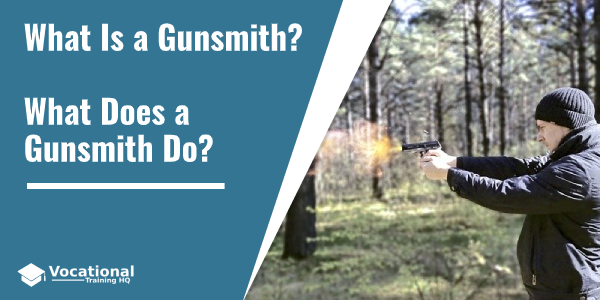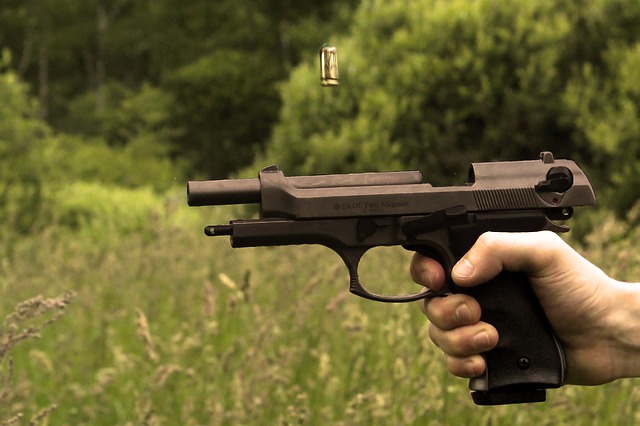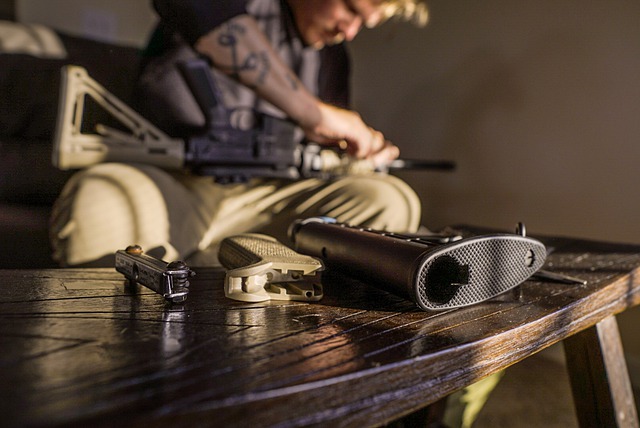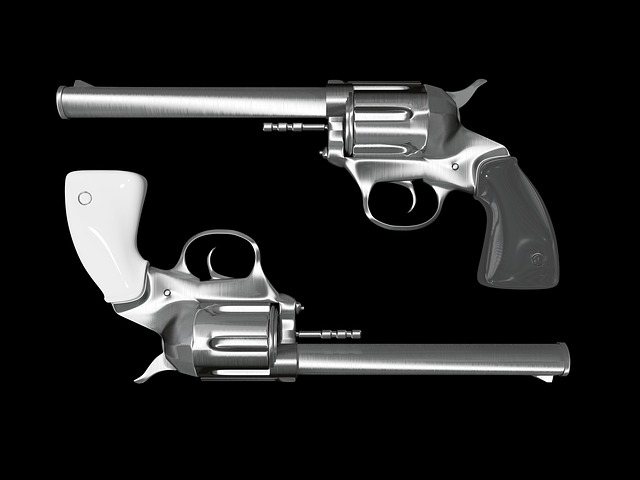A gunsmith is a person who takes not working guns and puts them back together, replaces parts to restore functionality, and modifies them to perform particular tasks.
They can also create a completely new firearm or an addition to a firearm from scratch.
Effectively, they restore guns to their original condition to ensure proper appearance, function, and safety.
Gunsmiths can also make carvings, engravings, and other decorative features to a finished gun.
Earn your accredited, affordable Gunsmith career diploma online with Penn Foster in as little as 3 months!
They work closely with people and meet the individual requests of customers.
Article Table of Contents
What does a Gunsmith do?
The main duty of a gunsmith is to ensure the safe functioning of guns.
They strictly follow procedures on safe gun handling and ensure the safe mechanical operation of the gun.
They evaluate firearms and determine where the failure may originate from, repair the deficiencies, and restore the gun according to specifications.
The safety concern or part malfunctions is often hard to spot or is so small that it has to be determined systematically.
A lot of work of gunsmiths involves woodwork, metalwork, parts fitting, and fabrication, as well as a smaller extent large machine work such as milling or drilling operations, lathe turning, sandblasting, material preparation, and chemical work.
Gun deficiencies can be:
- Cracks.
- Improper headspace.
- Missing parts.
- Improper assembly.
- Worn sear edges.
- Improper timing.
- Bore obstructions.
- Deformed firing-pin tips.
- Safety-mechanism malfunctions.
Gunsmiths specialize in a variety of areas:
Custom Gunsmith Builder/Designer
These gunsmiths take raw materials and shelf parts and build guns according to customers’ specifications.
They do custom work for professional sports shooters, target-shooters, as well as anyone who wants to add custom features to their firearm.
They can also make guns for hunters and shooters who are looking for more than standard manufacturers offer.
They may work with artists and engravers to make unique decorations and finishes.
Highly skilled gunsmiths, though, can complete all modifications without anyone’s help.
Finisher
These gunsmiths make corrosion-resistant surface layers on the steel part of guns by applying chemical processes (bluing, browning, Parkerization, etc).
They may also apply case-hardening, which is a combined heat-treatment and chemical process, to low carbon steel parts.
This way they create a thin but very hard surface layer with a malleable tough core.
This process can add rich colors to the carbonized surface.
It’s known as color case-hardening and is valued for its rich mottled purple, blue, gray, and brown tones.
The colored surface layers can wear out and fade over time.
Renewal of this color case-hardening to the patterns of the firearm when it was new is now an essential sub-area of gunsmithing.
Stockmaker
These gunsmiths make gun stock from wood, typically using walnut, but sometimes, maple, applewood, or birch.
They fit them to the guns’ metal parts and the customer’s body dimensions.
With custom-made shotguns, the fit is vital as the impact of the shot cloud is mainly determined by the way the stock fits the shooter.
For this, a very high level of skill and craftsmanship is needed since the finished product should be visually pleasing, able to withstand high levels of recoil from firings numerous rounds, and fit shooting customers perfectly.
Wood gunstock may be equipped with automated machinery while high-end gunstocks are handmade with chisels, saws, gouges, files, rasps, and finished by staining, scraping, sanding, lacquering, and oiling.
Checkerer
These gunsmiths use checkering tools to make ornate patterns of small raised diamonds in the wooden surfaces which will be gripped.
A v-shaped groove of about 60-90 degrees is made on the surface of a wooden gunstock with tiny saws.
The area that will be checkered is covered by a set of parallel grooves.
The second set of the same parallel grooves is then carved across the first one at about 30 degrees.
So the area is covered with small pointed diamonds.
Gun Engraver
Gun engravers engrave metal using hand-powered tools.
They use die-sinker’s chisels or hand-gravers to cut pictures or designs into the gunmetal surfaces.
First, a gun engraver should be an artist who can create the desired design freehand on paper and have a thorough understanding of human and animal anatomy, botany, composition, perspective.
The geometry and size of the parts should also be taken into consideration, as well as harmony between all these factors should agree artistically.
Usually, the design should be discussed and approved with the customer.
Then the design should be cut freehand in the hardened steel surfaces of the firearm.
Other metals, gold or silver, can then be engraved and inlaid in the design.
Designs usually include scroll-work or can be completely abstract spirals.
Top-grade engraving is highly costly.
However, engraving designed with taste always adds value to the firearm.
Pistolsmith
These professionals work on pistols and revolvers.
They are proficient in a wide range of skills such as checkering, machining, woodworking, metalworking, and finishing.
Pistol smiths also handle the customization of a handgun making it suit better for its purpose.
Standard model target pistols can be extensively worked on by proficient pistol smiths acquiring better accuracy than standard variations of the same arm.
Pistol smiths can also design a completely hand-fitted target arm with a serial numbered frame at the base.
Manufacturers supply parts with excess metal in some areas so pistol smiths can fit them together to a precise tolerance.
These gunsmiths can create extremely accurate firearms with higher accuracy than standard variants of the same arm have.
Some may work only on one or two types of pistols, but highly trained professionals work on more.
(Niche) Gun Manufacturer
These gunsmiths use their skills and experience to become small-operation manufacturers with a specialty in only a few types of gun parts.
Some of the most essential categories of parts are locks, receivers, barrels, and trigger assemblies.
What is the Workplace of a Gunsmith like?
Gunsmiths can expect to spend most time cleaning, examining, disassembling different types of guns, and performing minor part replacement as well as straightforward repairs.
They can also work in factories, armories, firearms manufacturers, law-enforcement or military agencies, small gunsmith shops, or sporting goods stores.
Typically, gunsmiths work 40 hours per week.
However, if gunsmiths are repairing or restoring a gun for customers that have deadlines, they may have to work some overtime hours.
Frequently Asked Questions
How long does it take to become a gunsmith?
While you can earn a certificate or degree to become a gunsmith within two years or less, it takes a few years to develop skills and achieve the level of expertise required to operate their own business.
Some gunsmiths start in the field with experience in the military as a machinist.
That with increase the time of learning.
Associate degrees in gunsmithing take about two years and usually include coursework in math, science, and English.
Certificate programs are shorter and don’t include general education classes.
Some schools partner with the National Rifle Association (NRA) and offer basic skills training through summer or short-term school curricula.
Online courses have been a big hit recently since social distancing has entered our lives.
What are gunsmiths like?
For most gunsmiths, what they do is more than just a job but a lifestyle.
It would be difficult to become a gunsmith and feel good about it without the love of firearms, or at least significant interest.
Most gunsmiths are focused practitioners.
The ability to manipulate the capabilities of a firearm brings great satisfaction.
They attain a feeling of legacy knowing that their touch is a part of every gun they work on.
Should I become a gunsmith?
To answer this question, you should ask yourself a few other specific ones:
-
Do I enjoy technical work?
Gunsmiths should understand the inner functions of firearms and be able to solve technical and weapon component issues.
-
Do I possess the qualities and characteristics that I will need to obtain a gunsmith position?
Gunsmiths need excellent mechanical skills to construct or repair the components of firearms.
Great hand-eye coordination, manual dexterity, and attention to detail are significant since some work can involve small components such as springs or levers.
Troubleshooting skills are also essential.
For example, gunsmith often has to diagnose and identify firearms issues. -
Do I have the necessary customer service and marketing skills?
A large portion of your income will come from customers requesting specific items, so you need to be comfortable interacting with various clients.
Besides, you will succeed the most if you launch your business.
Then you will need to have some level of business management and marketing understanding.
Building and maintaining a professional network and reputation is vital for success in this industry.
You can achieve this by attending industry events, gun fairs, volunteering at local gun-related events, gun clubs, and shooting matches. -
Does the gunsmith work environment suit me?
Gunsmiths work in workshops equipped with lathes, grinders, saws, drills and drill presses, and various metalworking tools.
Test firing is noisy.
There are other hazards such as heat, fumes, and powder smoke.
In this environment, workers should have normal hearing and no skin allergies. -
What sort of lifestyle am I seeking?
Gunsmiths derive much personal satisfaction from providing quality results, but the trade does not usually correspond with extravagant or flashy lifestyles.
Are Gunsmiths happy?
The building, designing, repairing, and customizing various guns can be fascinating and rewarding for those interested in working with firearms.
This is definitely one of the careers that some people start as a hobby and turn into an occupation that doesn’t feel like work.
One of the most appealing factors for aspiring gunsmiths is that the trade doesn’t require extensive and lengthy university studies.
Various work environments are another attractive factor in the field.
Besides the possibility of opening your own business, there are multiple opportunities in gun shops, firearm factories, sporting goods stores, the military, and law enforcement.
Gunsmiths also receive job satisfaction from combining a passion for firearms and the desire to promote safety.
Some gunsmiths find self-expression in the field rewarding.
Those who have artistic talents can take great pride in adding decorative touches or engravings to the guns.
Besides, the popularity of firearms and the need for high-quality guns provide job security and ensure that the skills of gunsmiths will be required all over the US.
On the downside, design improvement and industrialization reduced artisanship and specialization in the industry to some extent.
Most people can get a quality product at a reasonable price straight from the manufacturer, so the need for custom gunsmithing decreases.
Still, wealthy buyers prefer more expensive and elaborate custom firearms.
Read the full guide: How to Become a Gunsmith



